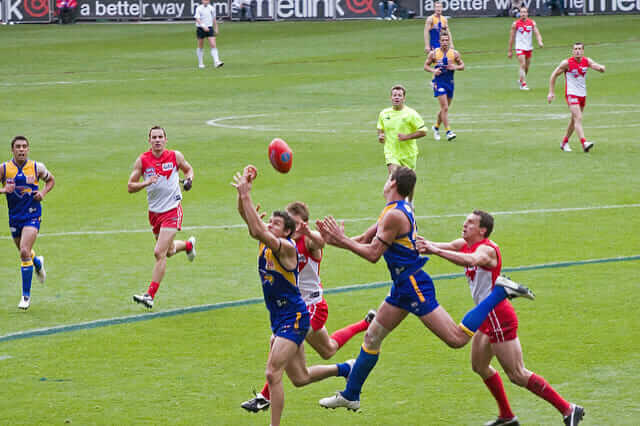Regardless of whether you’ll be participating in a local match or the AFL, you still will want to be able to perform at your peak for Football.
However, there is more to preparing for the next match than just going out and practicing with a football: your body and mind must be ready on a number of levels if you’re going to give your best performance.
Preparing for the next match should be looked upon as a continuous activity, rather than something you hasten to do a week before it’s time to play.
Football training throughout the Year
Football training shouldn’t start just a few weeks before the season starts up, if you’re serious about football. You should consider yourself to be in training every day. Preparation involves nearly every part of your life, even if you don’t realize it:
- Eating the right kind and right amounts of food are important not only as regards your performance on the field, but your overall health. Staying away from processed foods and too much sugar and fats can keep your body running strong. The proper food helps to replenish cells and tissues and helps keep circulation at its maximum. You also will have less chance of becoming fat by eating sensibly.
- Drink plenty of water to keep your metabolism functioning at its best. This is especially important when you’re outside and it’s hot; sweating depletes your body of water content and must be replenished to prevent dehydration. Sport energy drinks can help to keep your electrolytes balanced, too.
- A pint after a successful game with your mates is fine, but don’t overdo the booze. Excessive alcohol not only has a deleterious effect on certain organs such as the liver and brain, but it also adds calories, which can lead to you gaining too much weight. Rather alarmingly, alcohol damages your heart, and you need your ‘ticker’ to keep pumping blood reliably when you’re in a match. Too much drinking can also weaken your bones.
- Getting enough sleep at night has a profound effect not only on your football game, but on your overall health. Tired players will be less likely to react as quickly as they should, and tired muscles are more likely to become injured. You should aim for 6 to 8 hours of sleep every night, and if a nap during the day perks you up, don’t hesitate to nap out for half an hour or so.
Overtraining
A big mistake dedicated football players often make when getting ready for an important match is to overtrain. If you’re starting to spend every available second training, you’re actually making a big mistake, and the symptoms of overtraining are easy to spot, once you know what to look for:
- Your progress levels off and stalls.
- You start to feel grumpy and grouchy for no reason.
- If your resting heart rate has changed, you probably are overtraining.
- The number of injuries you experience while training increases.
- Muscles become sore when they are challenged, this is normal, but the soreness normally disappears after a day or two. If your muscles stay sore past 3 days, you should start looking at your training schedule.
- What was once an enjoyable sport that you looked forward to, now seems more like an unpleasant job.
Can Massage Therapy Help Footballers?
Even if you have been living your life and conducting your training perfectly, there is another way to help prepare for that next big match. This may not even have occurred to you, massage therapy. Not only is massage a great way to help sore and knotted muscles relax, it also helps maintain muscle tone as well.
Massage therapy can help to keep your circulation in tip top shape. So that your muscles and tissues will receive all the nourishment they need to enhance your performance. The fact that a massage helps you to relax can also help to dispel the negative effects of overtraining.
For anymore information or guidance feel free to contact me.
